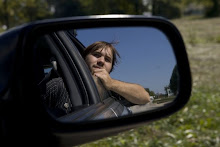
One of our weekend readings was a chapter from the book "On Being a Photographer" - a conversation between Magnum photographer David Hurn and the late photographer,professor, and author Bill Jay. The chapter is "Selecting a Subject", which touches on a crucial aspect of the photography process.
"The essential point (is) the subject matter you select must: a) fire your enthusiasm and curiosity for at least the length of time it will take to produce a meaningful body of work; b) lend itself to images, as opposed to words and; c) remain continuously accessible so that you can return time and again to the same topic whenever you wish or have time."
As photographers, we strive to live by this mantra. We know all too well what we produce if we don't follow these guidelines. That's not to say that everything we ever put in front of our lens always falls in line with this ideal, but it's what we want to accomplish in our search for meaningful photographic stories. I think the hardest part about this is taking the time for some introspection. That is - What does interest me. Sometimes I really don't know. There are sports, and people, and social issues, and places, but what about raw ideas? All too often the photographs we see in mainstream media are subject heavy. It's unfortunate, but it is also the nature of the medium. News photography, in this day and age, is the medium of death for meaningful photo-stories. You'd be hard pressed to find any in print in any given newspaper in the country. The death of the Rocky Mountain News sealed it.
"What is the alternative to an emphasis on subject matter? It is a frantic grasping for instant
gratification which all too often leads to works displaying visual pyrotechnics but of dubious depth and resonance. Photographers become pressured into a search for different-ness, a quest for new-ness which usually means an unusual technique: your dead-tree syndrome."
But how do we avoid this "dead-tree syndrome"? It can be very daunting to search for something new in photography without feeling like you are heading down a unlit path. If we are pressured into these things, yes, we usually, fail. But how can one find the environment which will sustain their lives, but still allow them the creative freedoms to search for the new and the different? If we devote our lives to a story, can we separate ourselves enough to still remain ethical "Photojournalists"?
"The fact is that all photographs, even of the most prosaic records of things, are subjective. They are made as a result of various decisions arising out of the mind of an individual. So inevitably that self will intrude on the picture-making process. It would be impossible to keep it out."
I found this quote to be a great summation of the idea that 100% objectivity is impossible. It is something that is often argued in the world of journalism. I think, as a photojournalist, once you come to this realization, you are free to let yourself explore the world more intimately. Of course, certain ethical rules still apply, but the idea of "objectivity" that was pounded into our brains in the early years has since been molded into more of a guide, rather than a rule.
Check out the chapter I posted. Bill Jay is sorrowfully missed in the photographic community and it is great to read his thoughts on photojournalism.

No comments:
Post a Comment